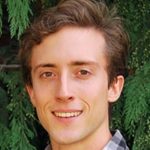In a continuation of last year’s seasonal series, this winter, each PCUR will interview a Princeton alumnus from their home department about his/her experience writing a senior thesis. In Looking Back on Undergraduate Research: Alumni Perspectives, the alumni reveal how conducting independent research at Princeton influenced them academically, professionally and personally. Here, Alec shares his interview.
~~~~~

Adrian Tasistro-Hart graduated in 2017 with a degree in Geosciences. A PEI Environmental Scholar, Adrian focused on one independent research project spanning his Junior Papers and Senior Thesis, which he plans on submitting for publication. Adrian is currently working towards a masters degree in Geophysics at ETH in Zürich, continuing his research journey which began at Princeton. Here is what Adrian had to say about his experience with undergraduate research and the impact of his independent research experience:
What was your thesis topic and what was the most exciting result?
My thesis focused on a really old lake that used to be in western Bolivia, before the Andes existed and roughly the same time that the dinosaurs were around. I studied rocks that formed from the sediments deposited in that lake by collecting samples and flying drones in the field. From the repeating patterns of rock layers, I was able to show that the same processes, called “orbital forcings”, that produced the ice ages also caused cycles in the hydrology of that lake. This result is important because the lake existed during a very warm period in Earth’s history, when we wouldn’t have expected climate sensitivity to orbital forcings. My research is helping inform us about how climate dynamics change when the world is warmer, which is particularly important given the current warming trend.
How did you choose your topic and adviser?
I knew I wanted to work with [Professor] Adam Maloof after taking every class that he offered, each of which included a 9-day stint in the field. I loved the field work, and I really enjoyed the way that I was learning: coupling field work with new quantitative methods in a previously very qualitative discipline. I decided to work on this project in Bolivia just by looking at satellite imagery and noticing crazy looking layered rocks that looked like bar codes. I had been interested for a while in using geologic records to test for periodicity in climate change, and these rocks seemed like the perfect sort of record to test that hypothesis.
How did you go about doing research for your thesis?
The field work itself consisted of setting up camp near one of my field sites and spending each day’s worth of sunlight collecting samples, making observations, and flying a small drone. The drone was one of the exciting but also stressful aspects of the research. It turns out that flying a small drone in the thin, frigid, windy, and dusty air at 13,000 ft on the Bolivian Altiplano is not easy.
What was the most rewarding aspect of writing your thesis?
The most rewarding aspect of writing my thesis was creating a computer program that allowed me to work with the drone data in a completely new and useful way. I really felt like I had an original idea that will further future research in this field, especially since drones are being applied more and more in field work. Overall, I was incredibly fortunate to have had the support and opportunities that I had in the Department of Geosciences. I’m very grateful for everything I learned and for the personal development that the department and my research experience fostered.
What was the most difficult aspect of writing your thesis?
The most difficult part of writing my thesis was prioritization. At the beginning, I think that most projects have an exciting scope of opportunities, and the first step has to be paring away the components that you won’t have time for. That’s always easier said than done, though, and I definitely found myself having to ditch exciting parts of the project towards the end just to be able to finish it. Now the most difficult part is just polishing it up to submit for publication!
—
Like Adrian, I am also a Geoscience major, now in the midst of my own independent research with Professor Maloof. Adrian’s reflections are particularly relevant to me, but they may resonate with any student engaged in independent work, facing the challenges of prioritizing goals and planning a manageable project, with the hope of producing a creative and original piece of research.
— Alec Getraer, Natural Sciences Correspondent

